Nissan Leaf vs VW ID.5 – Differences & prices compared
Compare performance, boot space, consumption and price in one view.
Find out now: which car is the better choice for you – Nissan Leaf or VW ID.5?
The Nissan Leaf (Hatchback) comes with a Electric engine and Automatic transmission. In comparison, the VW ID.5 (SUV) features a Electric engine with Automatic transmission.
When it comes to boot capacity, the Nissan Leaf offers 394 L, while the VW ID.5 provides 549 L – depending on how much space you need. If you’re looking for more power, decide whether the 217 HP of the Nissan Leaf or the 340 HP of the VW ID.5 suits your needs better.
In terms of consumption, the values are 16.70 kWh per 100 km for the Nissan Leaf, and 15.70 kWh for the VW ID.5.
Price-wise, the Nissan Leaf starts at 30800 £, while the VW ID.5 is available from 36800 £. Compare all the details and find out which model fits your lifestyle best!
Nissan Leaf
The Nissan Leaf stands out as a pioneering model in the realm of electric vehicles, known for its impressive blend of practicality and eco-friendliness. It offers a smooth and quiet driving experience, making it an ideal choice for city commuting and longer journeys alike. The interior design is both comfortable and intuitive, providing drivers with a sense of modernity and ease of use.
details @ germany.nissannews.com
@ germany.nissannews.com
 @ germany.nissannews.com
@ germany.nissannews.com
 @ germany.nissannews.com
@ germany.nissannews.com
 @ germany.nissannews.com
@ germany.nissannews.com
VW ID.5
The VW ID.5 is a stylish all-electric coupé SUV, designed to combine the practicality of an SUV with the sleek aesthetics of a coupé. Inside, the cabin offers a modern and spacious environment, featuring advanced technology that provides a seamless and intuitive driving experience. The ID.5 stands out with its dynamic performance and sustainable design, making it an attractive option for eco-conscious drivers.
details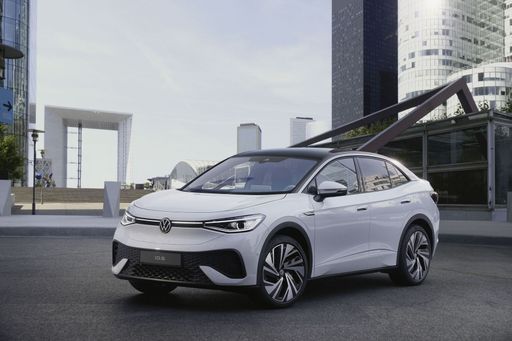 @ Volkswagen
@ Volkswagen
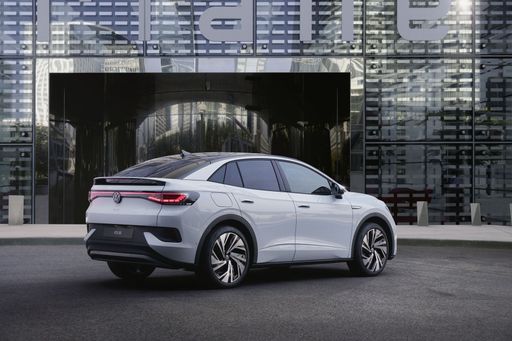 @ Volkswagen
@ Volkswagen
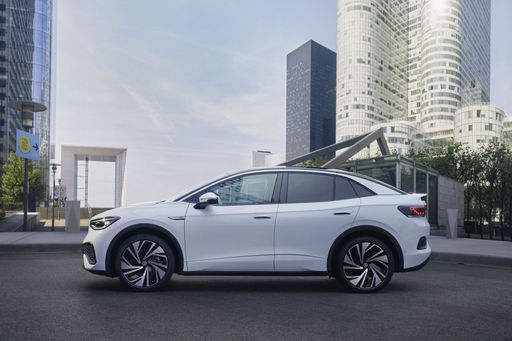 @ Volkswagen
@ Volkswagen
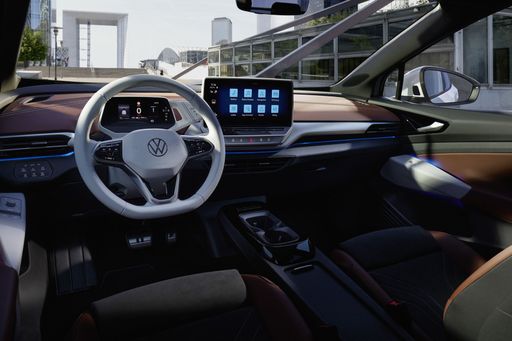 @ Volkswagen
@ Volkswagen
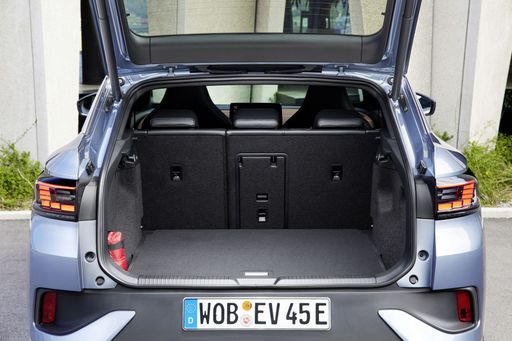 @ Volkswagen
@ Volkswagen
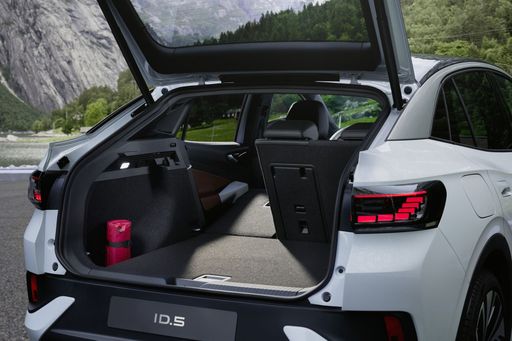 @ Volkswagen
@ Volkswagen

|

|
|
|
|
Costs and Consumption |
|
|---|---|
|
Price
30800 - 37200 £
|
Price
36800 - 48400 £
|
|
Consumption L/100km
-
|
Consumption L/100km
-
|
|
Consumption kWh/100km
16.7 - 17.8 kWh
|
Consumption kWh/100km
15.7 - 16.6 kWh
|
|
Electric Range
270 - 385 km
|
Electric Range
363 - 559 km
|
|
Battery Capacity
39 - 59 kWh
|
Battery Capacity
52 - 79 kWh
|
|
co2
0 g/km
|
co2
0 g/km
|
|
Fuel tank capacity
-
|
Fuel tank capacity
-
|
Dimensions and Body |
|
|---|---|
|
Body Type
Hatchback
|
Body Type
SUV
|
|
Seats
5
|
Seats
5
|
|
Doors
5
|
Doors
5
|
|
Curb weight
1580 - 1756 kg
|
Curb weight
1963 - 2246 kg
|
|
Trunk capacity
385 - 394 L
|
Trunk capacity
549 L
|
|
Length
4490 mm
|
Length
4582 - 4599 mm
|
|
Width
1788 mm
|
Width
1852 mm
|
|
Height
1540 - 1545 mm
|
Height
1601 - 1618 mm
|
|
Payload
384 - 415 kg
|
Payload
514 - 549 kg
|
Engine and Performance |
|
|---|---|
|
Engine Type
Electric
|
Engine Type
Electric
|
|
Transmission
Automatic
|
Transmission
Automatic
|
|
Transmission Detail
Reduction Gearbox
|
Transmission Detail
Reduction Gearbox
|
|
Drive Type
Front-Wheel Drive
|
Drive Type
Rear-Wheel Drive, All-Wheel Drive
|
|
Power HP
150 - 217 HP
|
Power HP
170 - 340 HP
|
|
Acceleration 0-100km/h
6.9 - 7.9 s
|
Acceleration 0-100km/h
5.4 - 8.9 s
|
|
Max Speed
144 - 157 km/h
|
Max Speed
160 - 180 km/h
|
|
Torque
320 - 340 Nm
|
Torque
310 - 679 Nm
|
|
Number of Cylinders
-
|
Number of Cylinders
-
|
|
Power kW
110 - 160 kW
|
Power kW
125 - 250 kW
|
|
Engine capacity
-
|
Engine capacity
-
|
General |
|
|---|---|
|
Model Year
2019
|
Model Year
2024 - 2025
|
|
CO2 Efficiency Class
A
|
CO2 Efficiency Class
A
|
|
Brand
Nissan
|
Brand
VW
|
Nissan Leaf
Introduction to the Nissan Leaf: A Pioneer in Electric Mobility
The Nissan Leaf has established itself as a trailblazer in the realm of electric vehicles (EVs) since its launch. As we delve into its present-day iterations, the Leaf continues to soar in popularity due to remarkable advancements in technology and sustainability. Let's explore what makes the Nissan Leaf a standout in today's automotive market.
Power and Performance: Under the Hood of the Nissan Leaf
The Nissan Leaf boasts a power output ranging from 150 to 217 PS, depending on the battery option chosen. The vehicle's electric motor, a product of cutting-edge engineering, offers instant torque ranging from 320 to 340 Nm, resulting in impressive acceleration capabilities. The 0 to 100 km/h dash is achieved in as little as 6.9 seconds, showcasing its prowess in electric performance.
Battery Technology: Efficient Energy Management
When discussing the Nissan Leaf, battery technology is at the forefront. The available battery capacities range from 39 to 59 kWh, supporting an electric range between 270 to 385 km. This flexibility allows drivers to choose a model that best fits their driving habits, providing peace of mind for longer journeys without frequent recharging.
Sustainability: The Environmental Edge
One of the primary attractions of the Nissan Leaf is its commitment to sustainability. As an all-electric vehicle, it produces zero CO2 emissions, placing it in the top tier of the CO2-efficiency class with an 'A' rating. This clean energy approach contributes significantly to reducing environmental impact and supports Nissan's drive towards a greener future.
Design and Comfort: Aesthetic Appeal and Practicality
The Nissan Leaf is not just about efficiency; it's also designed for comfort and utility. With its sleek hatchback body and dimensions of 4490 mm in length, 1788 mm in width, and a height of up to 1545 mm, it offers ample interior space. The boot capacity ranges from 385 to 394 litres, providing sufficient storage for everyday needs. The model accommodates five passengers comfortably, ensuring a pleasant ride for everyone.
Innovations and Safety: Advanced Features for Peace of Mind
Nissan equips the Leaf with an array of intelligent features that enhance safety and convenience. The available equipment lines, including N-CONNECTA, Tekna, e+ N-CONNECTA, and e+ Tekna, offer varying levels of technology integration. ProPILOT Assist, e-Pedal, and a comprehensive suite of driver-assistance technology are just a few examples that highlight Nissan's commitment to innovation in the EV market.
Conclusion: The Nissan Leaf Continues to Lead
With prices ranging from €35,900 to €43,400, the Nissan Leaf remains an attractive choice for those looking to embrace electric mobility. It perfectly balances performance, design, and sustainability, making it a compelling choice in the competitive EV landscape. The Nissan Leaf not only represents the future of driving but also reinforces why it continues to be a leader in the electric vehicle community.
VW ID.5
Discovering the VW ID.5: A Leap into the Electric Future
The VW ID.5 enters the automotive stage with the promise of innovation and sustainable motoring. As a striking addition to Volkswagen's electric vehicle lineup, the ID.5 sleekly combines the dynamic SUV form with state-of-the-art electric technology. Let us delve into the essential features and groundbreaking innovations that make the VW ID.5 a remarkable choice for the eco-conscious driver.
Cutting-edge Design Meets Everyday Practicality
With dimensions ranging from 4582 mm to 4599 mm in length, the VW ID.5 offers a robust presence on the road. Its modern aerodynamic silhouette is more than aesthetically pleasing; it contributes significantly to the vehicle's impressive energy efficiency. Inside, passengers can enjoy a spacious interior complete with a 5-seat configuration, and a generous 549-litre boot capacity provides ample storage for all journeys.
Performance and Powertrain Options: Tailored for Your Preference
The VW ID.5 boasts a spectrum of performance options, from the practical 170 PS Pure variant to the exhilarating 340 PS GTX all-wheel drive configuration. Each model is equipped with an advanced automatic transmission that ensures a smooth and seamless driving experience.
Drivers seeking efficiency will appreciate models with power consumption as low as 15.6 kWh/100 km and a remarkable maximum electric range reaching up to 563 km, setting new standards in electric mobility.
Innovative Technology at Your Fingertips
At the heart of the VW ID.5 is its array of cutting-edge technology. A state-of-the-art infotainment system keeps drivers connected, while advanced safety features, akin to those found in top-tier luxury vehicles, ensure passenger security. With intuitive controls and user-friendly interfaces, engaging with the car's high-tech capabilities is both simple and enjoyable.
Sustainability and Efficiency: A Zero Emission Pioneer
With a CO2 efficiency class rated A, the VW ID.5 takes its commitment to sustainability seriously. Its dual offerings of rear-wheel and all-wheel drivetrains allow drivers to choose efficiency that suits their driving needs without compromising on performance or comfort.
A Future-focused Driving Experience
The VW ID.5 redefines expectations for an electric SUV, presenting a harmonious blend of design, performance, and technology. It resonates with those who are passionate about sustainability yet unwilling to compromise on driving dynamics and comfort. The future of electric vehicles is here, embodied by the VW ID.5.
Priced between €42,970 and €56,455, the VW ID.5 is a significant investment in the esteemed Volkswagen brand and its innovative electric vision—ideal for those ready to embark on an eco-friendly motoring journey.
Which drive types are available for the Nissan Leaf?
Available as Front-Wheel Drive.
The prices and data displayed are estimates based on German list prices and may vary by country. This information is not legally binding.
